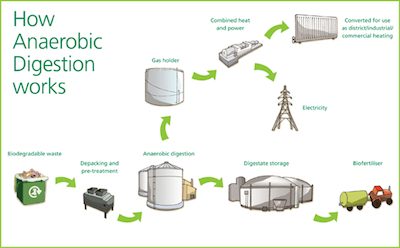
British supermarket, Sainsbury has taken it’s first store off-the-grid.
What took them so long?
The Cannock branch, West Midlands has unplugged from the National Grid, says the group chief office. Now it runs on power from anaerobic digestion (that’s wasted food to you and me).

Although only 10% of Sainsbury’s surplus or waste food goes to charitable causes, it is put to other uses. Some excess food that otherwise would be chucked away, is now delivered to a Biffa plant from Sainbury’s stores around the UK. Then it is turned into bio-methane gas which is then used to generate electricity that is directly supplied to the supermarket via a newly constructed 1.5km-long electricity cable.
Paul Crewe, head of sustainability at Sainsbury, said: “We send absolutely no waste to landfill and are always looking for new ways to reuse and recycle.” He claimed to be the first business ever to make use of this linkup technology.
But that’s not all, Sainsbury’s already has a name for itself in the UK for being eco-conscious. It’s the UK’s largest retail user of anaerobic digestion, generating enough electricity to power 2,500 homes each year. Under its sustainability code, its wasted energy is down 9.4% year-on-year. It was the first grocery retailer to achieve zero operational waste to landfill in 2013, You can view Sainsbury’s code of ethics here if you’re interested in their stance on other issues.
While Sainsbury’s donate surplus food to good causes, including local food banks, but when items can’t be collected they’ll instead be used for other projects such as animal feed, or to generate energy by anaerobic digestion. Leftover bananas from its Prescot Road store in Liverpool go to Knowsley safari park to feed the monkeys.
This is the second time the supermarket has made a conscious effort to be more eco-friendly in its retail outlets. In 2013, a branch in Haslucks Green became Britain’s most environmentally friendly convenience store after opening. For now though, Cannock is one of a kind.
Paul Crewe, Head of Sustainability from Sainsbury’s also told us that: “We were the first retailer to be able to take a store completely off-grid, thanks to anaerobic digestion, and our store in Cannock continues to operate well. As a large organisation we consume lot of power, so it’s important that we explore new ways of sourcing this, including off-grid options which help alleviate our impact on the grid.”
Now let’s hope other supermarkets across the globe follow in Sainsbury’s footsteps.
